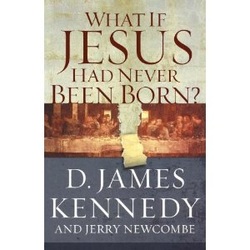Book Review: What If Jesus Had Never Been Born? The Positive Impact of Christianity in History1/11/2014
In the introduction the book posits the problem: We live in an age in which only one prejudice is tolerated -- anti-Christian bigotry. … Today, the only group you can hold up to public mockery is Christians. … But the truth is: Had Jesus never been born, this world would be far more miserable than it is. Chapter one gives an overview of the book. Chapter two shows that it was Christianity that elevated the value of human life (or maybe better stated - re-elevated it to what it was originally created to be). It is the Christian faith that gives dignity and meaning to every human, whether in or outside the womb, whether fully functioning at maximum health or suffering some debilitating disease or harm brought on by the fall. Chapter three concentrated on Christianity being the major driving force in history to helping the poor through charitable acts of mercy. Chapter four showed that the rise of education was due to Christianity’s influence on every culture to which it came. When written language was there, they would translate the Scripture into that language. When it wasn’t there, Christians would help develop a written language and then translate the Scripture into the language. And everywhere the Scriptures were translated, schools were built to further grow people in, above all, the knowledge of God’s Word. Chapter five gave an overview on the affect Christianity had on the founding of America. Chapter six demonstrated Christianity’s influence on civil liberties. Chapter seven showed the great impact Christianity has had on the advance of science (contrary to what secular media and public government schools might otherwise advocate). Chapter eight dealt with the influence Christianity had on economics, capitalism, and the free enterprise (specifically Protestant Christianity, although the reader might be interested to see Rodney Stark’s book, The Victory of Reason for a view showing Christianity in general rather than specifically Protestant Christianity providing the framework for capitalism) Chapter nine demonstrated the impact Christianity has had on the sacredness of sex and the high regard for family. Chapter ten gave a remarkable account of the history of hospitals due to Christianity’s foundation to the amazing work of health and medicine. Chapter eleven showed the impact Christianity has had on morality in general. Chapter twelve showed the influence Christianity has had on the fine arts (although, as the authors point out this has certainly been waning for a while now). Chapter thirteen told of the many lives changed for the better because of the Christian faith. Chapter fourteen went over some of the mistakes the “Church” had made over the years, but then also showed that the number of people hurt or killed by Christianity (or more accurately so-called Christianity) completely and utterly pale in comparison to the number of people hurt or killed by alternative philosophies. Chapter fifteen explored a little of counter-Christian philosophies and what the world would look like - and indeed does look like - when Christian restraints are removed. Chapter sixteen is a concluding chapter and a call to action. And I must certainly reiterate what I stated above - that this book is indeed a great contribution to the subject of what Christianity has done, can do, and should do in impacting the world. (Thoughts I've stated elsewhere.) But to be completely honest, I have to say that this book is not the best read. The style goes back and forth between polemic, rhetoric, sermon-esque, and middle school textbook. It also makes great claims (whether historical, research based, or otherwise) without citing sources. When it does cite sources they tend to be only secondary at best. Of course with such a wide range of topics I wouldn’t expect them to be able to cite many primary sources. But the reader does have to go into the book with the assumption that the secondary sources are truly reliable. As a matter of personal opinion, I trust the authors and assume they’ve done their homework. So I have no reason to doubt the reliability of the secondary sources they cite. Nonetheless, secondary sources will not be that convincing for the more scholarly minded. In conclusion: as a book for Christians to read to help them have a better understanding for what Christianity has done for mankind, and even give them a broad-scope range of talking points with their casual unbelieving friends, this would be a great book! But as a resource for those who are more academically minded and can spot non-sequiturs in a heartbeat (whether believer or unbeliever), I probably wouldn’t recommend it. That’s not to say that I don’t agree with the conclusions made in the book. I just don’t know that unbelievers will be that impressed because of the style and presentation of the material. Still, it was and is and should be an encouragement to believers to see that Christ’s work in His first advent was truly only the beginning of His ministry (see Acts 1:1). And the Holy Spirit has greatly built on the ministry down through the ages by means of using the corporate body of Christ - the church (Eph. 3:20-21). |
Categories
All
|
